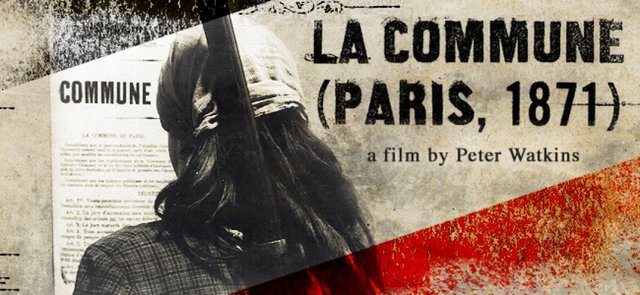
LA COMMUNE (PARIS, 1871) (2000)
Directed by : Peter Watkins
I stand back, and look at La Commune (Paris, 1871) with one hell of a lot of admiration and respect. This isn't a movie that's different for the sake of being different - it's eccentricities yield concrete results for both the casual viewer and those who might want to analyse it with more thoroughness. The hard part is the fact that this has a running time of 345 minutes - but more about it's length later. This is about a moment in French history when revolutionaries set up their own government in Paris during the Franco-Prussian war, and were put down by the French Army despite their Commune being defended by the National Guard. But more than that, this film is about revolution as a whole, as well as economics in our current age and world politics. The events aren't filmed as they normally would be - we're given a tour of the set before everything commences, and are introduced to some of the actors who talk about their characters. Then, when the story does commence, performers often stop to explain how their characters are feeling, or else about how the actors themselves are feeling about anything they may wish to express during peak moments of tension or emotion. It's all a very free-form process where there is no fourth wall anymore, with both real world and imaginary world bleeding into each other.
Another difference you'll find in the Paris of 1871 is that in this version television and the media exist as they do today. No other modern technologies or differences are apparent but that - so we get to see news broadcasts and television interviews during the months of revolution in Franco-Prussian-war era Paris. A large portion of the film is devoted to on-the-street interviews - and Watkins has hundreds of actors at his disposal here all playing their parts. Throughout the film we get regular intertitles that explain in detail all of the events as they transpire - something I really appreciate, because that makes it much easier to follow proceedings. They impart much information, and it means the actors don't have to constantly worry about exposition - they can simply get on with playing their roles. Many of these roles consist of people attending committees and meetings where passionate revolutionaries debate about what actions to take, but there are also convent schoolgirls, wealthy older ladies who are against the Commune, soldiers from the National Guard and historical figures like French President Adolphe Thiers (played by Jean Giacinti). Everyone plays their part as if this is all 100% real while at the same time free to express themselves in any way they see fit and make comparisons to today's world. It's as if two worlds have fused together into one.
So this one requires stamina to a certain degree - (but it's by no means the longest film made by Peter Watkins - that would be Resan, which tops the list of "longest non-experimental movies in history" at 873 minutes.) I could have watched the "short version" of La Commune, the theatrical cut, but even that goes for 220 minutes. Watching, we can see how the revolutionaries frequently shoot themselves in the feet - often making conditions for the poor even worse than they were before, seeing wages continually cut as they try to do too much too quickly and lose sight of the bigger picture. They waste time debating, and their debates are never filtered - there should be a process where ideas can be seconded, voted on and then implemented into real-world action. Instead, energy and time is wasted. When the French troops do eventually arrive, despite having months, they catch the National Guard flat-footed and unprepared. While many revolutionaries are happy to give their lives for the cause, the civil war ramps up until terrible atrocities occur - monstrous even by today's standards. Throughout Watkins manages to glean what's pertinent for today's world, perhaps in the hopes he can wake people up from their slumber. Some historians think much of what's rotten with today's system of governance and finance started in Paris, 1871. I don't know about that - but I do know that this is an insane movie-making feat that does something profound to both filmmaker and spectator.
Glad to catch this one - Michael Atkinson of The Village Voice listed this as the #1 film made since 2000. It holds a 100% rating on Rotten Tomatoes.

Watchlist Count : 429 (-21)
Next : Full Time (2021)
Next : Full Time (2021)
Thank you very much to whomever inspired me to watch La Commune (Paris, 1871)
__________________
Remember - everything has an ending except hope, and sausages - they have two.
Latest Review : The Mob (1951)


















